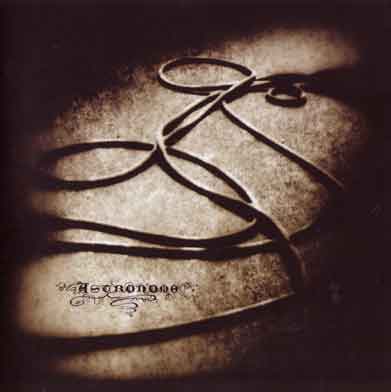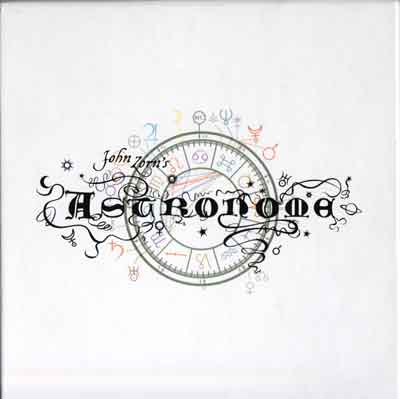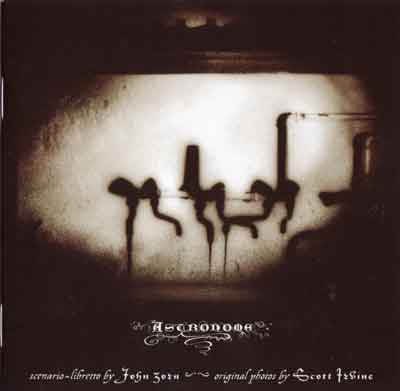JOHN ZORN






1/ ACT ONE (Zorn) 14.33
Scene 1: A SECLUDED CLEARING IN THE WOODS
a full moon illuminates a coven dancing around a large bonfire * an orgy
Scene 2: A SINGLE BED IN A SMALL ROOM
midnight * the initiate, asleep, is haunted and possessed by demonic spirits
Scene 3: THE INNERMOST CHAPEL OF A SECRET TALE
the summoning of demons by the coven * a satanic baptism * visitation by the lord of light
2/ ACT TWO: (Zorn) 17.00
Scene 1: A MEDIAEVAL LABORATORY
divination by the tarot * alchemical experiments * elixers of transformation
Scene 2: IN THE MAGICK CIRCLE
spells and obeahs of possession * raising the dead * a sacred ceremony
3/ ACT THREE: (Zorn) 12.44
Scene 1: A BARREN PLAIN AT MIDNIGHT
the battle of the wizards * a ritual of sacrifice
Scene 2: AN UNNAMED LOCATION
transvection * readings from the sacred book * magick symbols and sigils * transcendence
Recorded April 2006 at Orange Music Studios, West Orange, New Jersey
Engineer: Robert Musso
Assistant: James Dellatacoma
Mix Translation: Bill Laswell
Produced by John Zorn
Associate Producer: Kazunori Sugiyama
Mastered by Scott Hull
Trevor Dunn: bass; Joey Baron: drums; Mike Patton: voice.
2006 - Tzadik (USA), TZ7359 (CD)Note: This deluxe set comes with two full color booklets in an oversized box.
The closest approximation to Astronome 's sound is that of a free-jazz power duo that Zorn convinced to play death metal, recruiting Mike Patton (of Mr. Bungle and other fame) to do vocals. Consisting of Joey Baron on drums and Trevor Dunn (also of Mr. Bungle) on bass, this power duo plays very heavy music that can only be called metal, but there are no recurring riffs, and the improvisatory nature of many of the sections is far closer to jazz than to metal. Meanwhile, Patton showcases his full vocal range (which is among the best in rock), telling a story not through words but through babbles, shrieks, fake vomits, and just about everything else. He takes the foundation set by Baron and Dunn and uses it as a launching pad to say whatever he (or rather Zorn) feels needs to be said. And, while you can't actually "translate" his babbling into any recognizable language, he is so good at what he does that you truly feel like you understand what he is trying to say.
That is the key success of Astronome: it truly lives up to the "Songs Without Words" subtitle given to Moonchild (the first CD Zorn composed in this vein). The only real problem (and, admittedly, it can be a big one at times) with Astronome is that some of the softer sections seem somewhat lifeless. When it works (which is most of the time), however, Astronome is a triumph, a CD that captures the ability of metal to energize, but does so through all the compositional rigor of classical music, and, as such, it is one of the finest in Zorn's extensive catalogue. It has more footholds than Moonchild and is more minimalist than Six Litanies for Heliogabalus (the most recent in the Moonchild vein), and this balance proves to be, as Goldilocks would put it, just right. While I find Six Litanies for Heliogabalus is better than Astronome, both are phenomenal. Those not familiar with Zorn's work may find his "extreme avant-garde" tough to swallow, at least at first, but I believe repeated listens will reveal Astronome to be one of the finest CDs of the 2000s.
Aaron N. (courtesy of the Ground and Sky website)
In the strictest sense, John Zorn is not a progressive rock musician. On his latest releases, however, he has been working with prog musicians to create a verifiably prog music of highest quality. Mike Patton (vocals) and Trevor Dunn (bass) of Mr. Bungle, as well as Joey Baron (drums) team up with Zorn (“composition”) for his 2006 release, Astronome, one of the greatest albums of this young millennium, and indeed one of the greatest albums of all time.
Zorn does not actually play his saxophone on the album. Instead, he “composes” the music that you hear. I put “composes” in quotation marks because he does not compose in the traditional sense. Instead, he formulated ideas for what he wanted to happen on the album and conveyed that orally to his three musicians, who then built around his “oral composition” to create the actual music. Zorn’s ability to find new ways of mixing composition and improvisation is his greatest strength, at least how I see it. Early in his career, he created his game pieces (the most notable being Cobra). With game pieces, he devised a set of rules that governed the reactions between the musicians, who had to improvise while following these rules. The result is a variable composition, always similar in structure but with a different sound depending on the musicians involved. Game pieces and “oral compositions” are not the only compositional innovations of Zorn, by the way. Throughout his career he has tinkered with the notion of composition and improvisation working together to create music, creating the methods by which the two could be brought together seamlessly, as they are on Astronome.
John Zorn certainly assembled a stellar cast to carry out his vision for Astronome. Trevor Dunn is a phenomenal bassist, and he manages to carry out the work of both guitarist and bassist on this album only using his bass. The sounds he creates are truly incredible, launching him into any respectable list of great bassists. Anchoring him is Joey Baron on drums, and he is, if anything, even better (which is really saying something). Throughout the album, Baron can be clearly heard, and I’m thankful for that, as his drumming is phenomenal. He devised some truly intricate beats for this album that gave it a fantastic groove you would not normally expect from an album of this nature (I’ll get to the album’s nature shortly). He’s no one-trick-pony, mind you, as he is also able to fall into avant weirdness with ease when the music requests it. Finally, there is Mike Patton. Trevor Dunn and Joey Baron are masters of their instruments, but Patton is the creator of his. Nothing that he does is imitated by anyone, at least as far as I know. His vocal experimentations are at their prime on this album, and while they may turn many listeners off (assuming the music doesn’t do that first), I find them to be the highlight of the album, the one factor that truly sets it apart from every other album.
The album is divided into three acts, all over ten minutes in length, and all roughly equal in terms of quality, though the second one is my favorite. Over the course of the album, we travel from dark and imposing passages to soft and sinister ones, from periods of vocal dominance to stretches of brutal heaviness that would do Meshuggah proud, and just about everything in between as well. To the album’s enormous credit, it manages to do all this without sounding at all slipshod; every new theme flows out of the last admirably, creating a seamless whole that translates into a brilliant album. Be warned, however. This is some of the most extreme music out there. I don’t mean in terms of heaviness, though it certainly is very heavy at times. Rather, I am discussing the album’s affair with inaccessibility. There are no melodies to hum here whatsoever. There are no hooks within a ten-mile radius. This is an album that will challenge your views of music from start to finish, and I wouldn’t expect most people to like it. So, here’s a quick test. If you like bands such as Meshuggah, Sleepytime Gorilla Museum, Faust, and Mr. Bungle, you will likely be able to recognize this album’s genius and appreciate it. If you don’t like those bands because they are too heavy (Meshuggah, Sleepytime Gorilla Museum, Mr. Bungle) or too weird (Faust, to a lesser extent Mr. Bungle and Sleepytime Gorilla Museum), you probably won’t find much to hold your interest here.
While this is an album that will expand your musical horizons greatly, you should definitely stretch those horizons first (much as you would when blowing up a balloon). Once you have done that, however, if you feel up to a highly adventurous, innovative, unique, and captivating album, Astronome is just the thing for you, though it still might be best to get Six Litanies For Heliogabalus first, a Zorn album in a similar style to this one, of roughly the same quality (Astronome is slightly better, I find, though many prefer Six Litanies), and a tad more accessible (in a completely relative sense). In the meantime, I give this album a solid “A” (masterpiece) and trust you to use appropriate caution when approaching this beast of an album. Not for the faint-hearted!
Pnoom (courtesy of the Progressive Ears website)